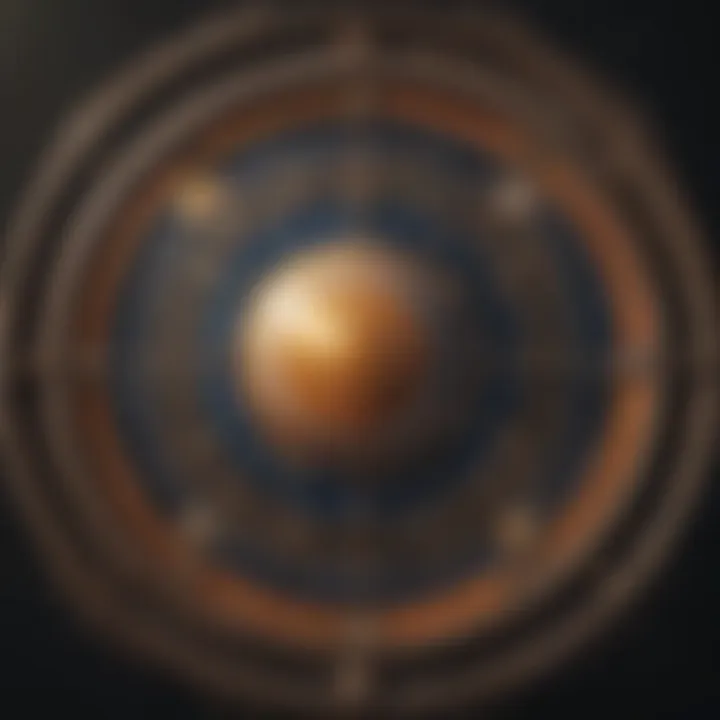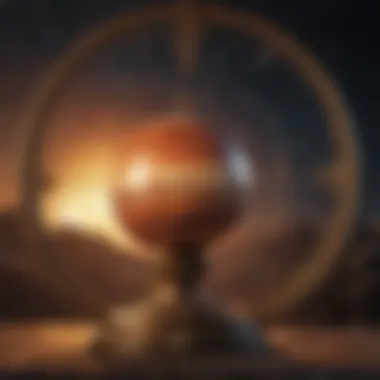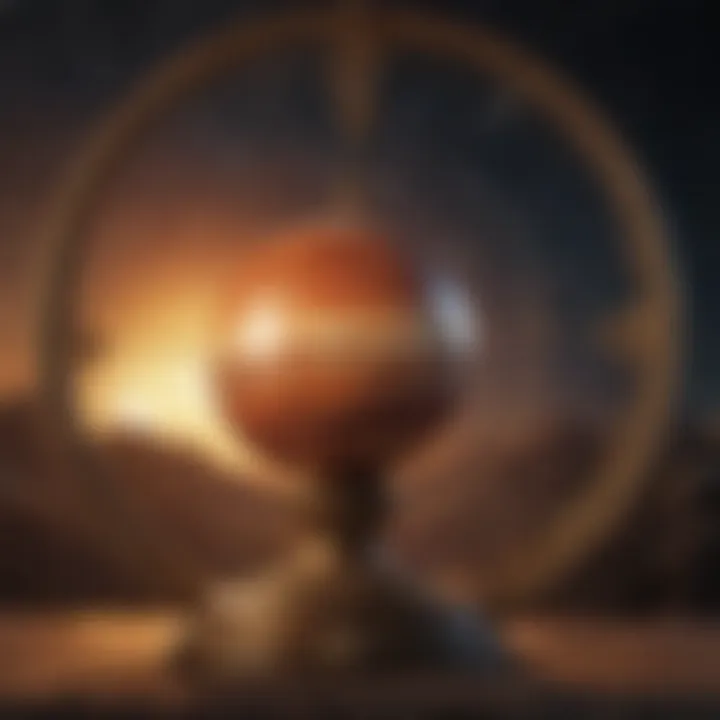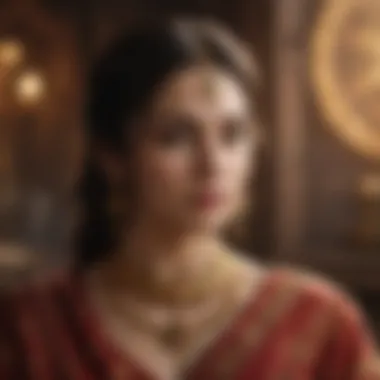Exploring the Depths of Vedic Astrology Reading


Intro
Vedic astrology, steeped in centuries of history, holds a mirror to the cosmos and invites us to reflect on our lives through its intricate interpretations. This esoteric art, originating from the ancient Indian scriptures known as the Vedas, maps the stars and planets to offer wisdom about our personalities, relationships, and life paths. Unlike Western astrology, which often relies on sun signs alone, Vedic astrology encompasses a more holistic view, casting attention on the moon's positions, ascendants, and planetary alignments.
For those enthused by astrology or keen on holistic life approaches, this guide seeks to be your compass, illuminating the principles that guide Vedic astrology reading. From understanding zodiac profiles and their inherent traits to gleaning compatibility insights and adapting during astrological events, this exploration aims to deepen your comprehension and appreciation of this time-honored practice.
By unlocking the secrets of your astrological chart, you can navigate life's challenges with poise and clarity. It becomes less about predicting a static future and more about leveraging your celestial blueprint to foster personal growth. Whether you are just dipping your toe into the watery depths of astrology or are a seasoned navigator of the zodiac, each chapter promises a wealth of insights tailored to suit all levels of understanding.
Prelude to Vedic Astrology
Vedic astrology, known as Jyotish, is not just another branch of astrology; it carries the weight of ancient wisdom and cultural significance. Understanding its nuances can be a game changer for anyone looking to explore their life’s direction through the celestial lens. In this section, we will delve into the historical roots and core principles that form the bedrock of this mystical science, while also shedding light on its immense relevance in today’s fast-paced world.
Historical Context
To truly appreciate Vedic astrology, one must appreciate its rich tapestry, woven over millennia. Originating from ancient India, the roots of this practice are intertwined with the Vedas - the oldest sacred texts known to humanity. Vedic texts like the Rigveda and the Yajurveda mention celestial phenomena and their correlations to earthly events.
Throughout history, Vedic astrology has had its highs and lows. During the times of royal courts, astrologers were valued immensely, often consulted for major decisions ranging from the timing of wars to the selection of auspicious days for ceremonies. However, during periods of foreign invasions, this knowledge faced suppression.
Interestingly, the influence of Vedic astrology can even be seen in contemporary practices around the globe. As cultures meld and adapt, the principles of Jyotish have begun sprouting in Western scopes, leading to a unique blend that borrows heavily from these ancient roots.
Core Principles
At the core of Vedic astrology lies a set of principles that differentiates it from Western astrology. While both systems analyze celestial positions, Vedic astrology utilizes the sidereal zodiac, which considers the actual constellations’ positions, as opposed to the tropical zodiac used in Western practices.
One of the essential tenets of Vedic astrology is the concept of karma. It is believed that the planets influence not only our personalities but also the fate we create through our actions. Each celestial body is tied to specific significant life areas, allowing practitioners to glean insights into various challenges and triumphs one might encounter.
Additionally, the intricate structure of the birth chart, known as the Kundali, contains twelve houses and nine planets. Each house corresponds to different aspects of life, from relationships to career, while the planetary positions unveil a narrative unique to each individual.
Through the lens of this ancient wisdom, Vedic astrology offers a tool for self-exploration and growth. It encourages practitioners to harness their understanding for personal development, providing clarity in decision-making and enhancing one’s journey through life's ups and downs.
"Astrology is the art of understanding one's self through the transit of celestial bodies."
As we move further in this exploration of Vedic astrology, expect a detailed guide to birth charts, planetary significance, and the practical applications of this ancient science to enrich your life.
Understanding the Birth Chart
The birth chart, or natal chart, is often viewed as the heart of Vedic astrology. It's a detailed map of celestial bodies at the precise moment of an individual’s birth, providing insights into their personality, strengths, challenges, and potential life path. Understanding this chart is a critical step for both practitioners and enthusiasts alike, as it forms the foundation for interpreting an astrological reading. The chart functions as a personalized blueprint, mapping one's tendencies and influences, communicating the cosmic story of life.
This section elucidates several aspects concerning birth charts, including their structure, the intricacies of calculating birth date and time, as well as interpreting their various components.
Structure of the Birth Chart
At its core, the birth chart comprises various elements that represent the positions of the planets, Sun, and Moon at the time of birth. Typically, it is depicted as a circle divided into twelve segments, each known as a house. These houses relate to different aspects of life, such as relationships, career, and personal growth. Each house effects individual attributes and experiences.
To break it down further:
- Rashi (Zodiac Sign): The twelve signs of the zodiac are crucial in determining one's inherent traits and behaviors. Each sign contributes unique qualities to the person.
- Bhava (House): There are twelve houses, and each governs different life facets. For example, the first house relates to self-identity, while the seventh house is about partnerships and marriage.
- Graha (Planets): Each planet has specific influences. The Sun symbolizes ego and vitality, while Jupiter is a beacon of wisdom and expansion.
This structural synergy between Rashi, Bhava, and Graha creates a comprehensive narrative, guiding astrologers in their interpretations.
Calculating Birth Time and Date
Getting the birth time and date right is vital. Even a few minutes can shift the entire reading. In Vedic astrology, the exact moment when the Sun rises on the eastern horizon marks the start of a new day, and therefore, the significance is attributed to the degree of the ascendant (first house). Here’s what to consider:
- Accuracy is Key: Always ensure the timing is as precise as possible. For instance, if uncertain about your birth time, consider consulting family or birth certificates.
- Zone and Daylight Savings: Don’t overlook the time zone and presence of daylight savings time in the calculations. Each can heavily influence the chart.
- Leap Years and Calendars: Awareness of how leap years were applied can also affect the calculation. Use accredited resources for accuracy.
Proper calculation ensures a robust foundation for any astrological interpretation.
Interpreting Various Components
With the birth chart in hand, the next significant step involves interpreting its components. Each element held within the chart bears unique insights:
- Lagna (Ascendant): This is often regarded as the mask one wears in public. It indicates how others perceive the individual.
- Moon Sign: This sign is reflective of emotional and subconscious states, offering insight into one's inner workings and reactions.
- Planetary Positioning: The locations of various planets in relation to houses determine influences over time. For instance, if Mars resides in the tenth house, one may find strong ambition in career pursuits.
Interpreting these components is like reading a book about oneself, unveiling many aspects of past, present, and future behavior. Astrologers often look for significant patterns or tensions among the components to guide their reading.
"In a world that often feels chaotic, the birth chart serves as the cosmic compass that connects us to our true selves."
The meticulous practice of understanding these elements can lead to profound self-awareness and growth, both spiritually and emotionally.
Key Planets and Their Significance
In Vedic astrology, the planets hold substantial weight in determining the dynamics of individual lives. Each planet serves as a cosmic player in the grand narrative of existence, influencing everything from personality traits to life events. The significance of these celestial bodies is foundational for anyone seeking to understand their astrological readings. By recognizing the effects of the planets, practitioners can better interpret the messages that their charts convey.
The Sun's Influence


The Sun is often hailed as the most vital entity in the Vedic astrological landscape. It represents the self, vitality, and ego. In many ways, the Sun is the center of the solar system and metaphorically, the center of one’s personal universe. When the Sun is strong in a chart, it can indicate a person who possesses inherent strength, charisma, and a clear sense of purpose.
Conversely, a poorly positioned Sun might suggest issues with self-esteem or difficulties in personal expression. This planet’s placement by house and sign can provide critical insights into how a person interacts with the world.
House System in Vedic Astrology
Understanding the house system in Vedic astrology is paramount to interpreting charts effectively. Each house serves as a unique lens through which various aspects of life can be viewed, offering insights that can feel almost surreal at times. In this ancient practice, the twelve houses represent distinct areas of life, from personal identity to relationships, profession, and even spiritual growth. Knowing where the planets sit within these houses can illuminate specific influences on an individual's life journey, guiding decisions and reflections.
The beautiful aspect of this system is its ability to tie the cosmic into the personal. Each house encapsulates different experiences, and the interplay of these houses reflects the complexity of human existence. When someone explores their chart, it’s like opening a door to understanding why certain events unfold in a specific manner—almost as if the universe were speaking in code.
Understanding the Twelve Houses
The twelve houses in Vedic astrology represent an array of life themes, each imbued with profound significance. Here’s a closer look at what they represent:
- First House (Ascendant): This house signifies self, appearance, and overall approach to life. It’s your face to the world.
- Second House: Associated with wealth, possessions, and values, this house reveals aspects of financial standing and how one perceives value.
- Third House: This house reflects communication, siblings, and learning. It is about how we relate to those around us and our immediate environment.
- Fourth House: The house of home and family, it covers emotional foundations and domestic affairs.
- Fifth House: Creativity and self-expression are dominant themes here, along with children and romantic affairs.
- Sixth House: This house points towards health, service, and daily routines. It's a reflection of how we handle everyday challenges.
- Seventh House: As the house of partnerships, this area considers marriage and significant relationships.
- Eighth House: Intimacy, shared resources, and transformation take center stage in this house, exploring deeper connections.
- Ninth House: Philosophical thoughts, higher education, and long-distance travel are themes of this house.
- Tenth House: Focused on career and public image, this house speaks to ambitions and professional standing.
- Eleventh House: Friends, groups, and aspirations come into play here, showcasing social networks and collective goals.
- Twelfth House: Often seen as a house of the subconscious and spirituality, it delves into hidden realms, isolation, and release.
Each house reflects aspects of life that may evolve as planets transit through them, influencing our experiences as individuals. The positions of planets in these houses can tell stories, helping us highlight areas needing attention or significance in one’s life.
Impact of Houses on Life Areas
The impact of each house on the life areas is profound, shaping how individuals navigate their journeys and respond to the world around them. When analyzing planetary placements, it's crucial to consider how they interact with the energy of each house:
- Career Choices: The tenth house guides choices regarding profession, thus affecting one's life purpose and societal contributions.
- Relationships: The seventh house reveals dynamics in partnerships, highlighting compatibility and areas for growth with significant others.
- Health and Well-being: The sixth house brings attention to daily habits and health challenges, urging us to adopt more conscious choices.
"In the grand scheme, understanding these houses is not merely an academic exercise; it can lead to transformative insights that fuel personal growth and enhanced decision-making in challenging times."
While interpreting your chart, it's essential to remember that the house system's influence extends beyond mere luck. It encourages a proactive approach to life, emphasizing the importance of choices and awareness. Recognizing how the planets interact within these houses can lead to a more enriched and harmonious life.
Dasha Systems: Timing and Predictions
Dasha systems serve as a fundamental component within the realm of Vedic astrology, illuminating how time influences one’s life path and experiences. The concept of Dasha, which can loosely be translated to mean 'period' or 'stage', helps astrology enthusiasts to understand the cyclical nature of existence. Whether someone is grappling with personal challenges or looking to seize new opportunities, awareness of their current Dasha can significantly shape their decisions and mindset.
Understanding Dasha is not merely about predicting what is to come, but rather about recognizing the patterns and rhythms that underlie life’s events. Each period represents a unique phase marked by the influence of different planets, mapped out by numerical cycles that correlate with an individual’s birth chart. Hence, comprehending one’s Dasha can unveil insights into timing, guiding individuals through life's complexities with greater clarity.
"The right timing is everything; the stars can guide us, but only we can take the leap."
What is a Dasha?
At its core, a Dasha is an astrological period governed by a specific planet, which exerts its influence on the individual's life during that time. Each Dasha has a distinct energetic quality, often correlating with the traits associated with the ruling planet. For example, if someone is experiencing the Dasha of Venus, they might find insights related to love, beauty, and harmony coming to the forefront of their life.
In Vedic astrology, the calculation of these periods typically employs the Vimshottari Dasha system, which divides the lifespan into segments that vary in duration based on planetary positions at birth. The principle behind this system rests on the assumption that different planets rule over various phases of life according to their inherent natures and energies. This means that one's life experiences can be mapped out in layers, with each Dasha influencing one's emotional and spiritual development in distinctive ways.
Types of Dasha Systems
When delving into the world of Dasha systems, it’s crucial to recognize that there are various types applied within Vedic astrology, each with its unique structures and interpretations. Here’s a snapshot of some prominent Dasha systems:
- Vimshottari Dasha: The most popular system, dividing life into 120 years, with different planets governing specified time frames.
- Ashtakavarga Dasha: Focuses on a scoring system based on planetary positions that offer insight into periods of favorable and unfavorable events.
- Chara Dasha: Calculates the Dasha according to the movements of the Moon through the different signs of the zodiac, emphasizing adaptability.
- Nadi Dasha: Derives from ancient texts, where the astrologer's readings can lead to personalized predictions based on one's thumbprint.
Recognizing the type of Dasha that resonates with one's birth chart can guide practitioners in making informed decisions and planning ahead. Each system also holds its nuances, which practitioners often need to consider when drawing conclusions about what lies ahead.
Dasha systems, with their intricate yet meaningful structure, borrow from the ancient wisdom of Vedic practices, continually contributing to how individuals navigate time in life. Whether one views it as a sacred roadmap or a practical tool, it undeniably enhances both understanding and foresight.
Transits and Their Impact
Transits play a crucial role in Vedic astrology, acting as dynamic forces that influence the energy and circumstances in our lives. When planets move through different houses in the natal chart, their positions create various effects and opportunities that can manifest differently, depending on the individual’s unique chart. Understanding transits allows astrologers and enthusiasts to predict significant life events, enhancing one's ability to navigate challenges and embrace opportunities. The beauty of transits lies in their ability to show periods of potential change, urging individuals to adapt and evolve.
What are Transits?
Transits refer to the ongoing movement of planets through the sky relative to the positions they held at the time of a person’s birth. This movement can create distinct influences that may resonate with different areas of one’s life. For example:
- The Sun represents vitality and self-expression, and its transit can illuminate themes of confidence.
- Saturn, on the other hand, is often associated with discipline and responsibility, marking periods where hard work may be necessary.
In Vedic astrology, these transits are analyzed in relation to the 12 houses of the birth chart. Each house represents a different aspect of life, from personal relationships to career and health. When a planet transits through a house, it can bring events or feelings connected to that life area. It’s a kind of cosmic signal, alerting you to what you may need to focus on or act upon.
Analyzing Planetary Movements
To interpret the influence of transits, it’s essential to keep a close eye on both the nature of the planets involved and the houses they are moving through. A few factors to consider include:
- Planetary Nature: Each planet brings its unique traits and energy. For instance, Venus fosters harmony and attraction, while Mars instigates action and sometimes conflict.
- Houses Affected: Understand how the moving planet interacts with your natal planets and the specific houses it touches.
- Timing and Duration: Note that some transits last for days while others might stretch over several months or even years. The longer a planet stays in a house, the greater its influence.
- Retrogrades: When a planet is in retrograde, its effects can be felt in reverse, often calling for introspection and reevaluation in areas affected by the planet's energy.
By combining these details, you can gain valuable insights into the likely themes and transformations you'll experience during a given period.
"The influence of transits acts like waves on a river; some are gentle ripples, while others might cause a flood. Understanding these movements can help you sail smoothly through life's changes."
Synastry and Relationship Compatibility


In the realm of Vedic astrology, the concept of synastry, or compatibility analysis, plays a crucial role in understanding personal relationships. It goes beyond simple romantic encounters; it encompasses friendships, familial ties, and professional associations, offering insights into how individuals relate to one another based on their astrological profiles. The beauty of synastry lies in its ability to reveal the underlying dynamics within a relationship, allowing individuals to comprehend both harmonious and challenging aspects.
Foundations of Synastry
Synastry is built on comparing the birth charts of two individuals, often focusing on key planetary placements and aspects that facilitate or impede the connection between them. Here, the Moon, Venus, Mars, and even the Ascendant take center stage. These celestial bodies provide a lens through which one can view emotional compatibility, attraction, and potential conflict.
- Key Elements to Consider:
- Planetary Aspects: These are the angles formed between planets in the respective charts. Favorable aspects, like trines or sextiles, usually point to ease in interaction, whereas challenging aspects, such as squares or oppositions, highlight areas needing work.
- House Overlay: When one person's planets fall into the houses of the other’s chart, it indicates how each individual influences the life areas represented by those houses. For example, if someone’s Venus falls into the other person's seventh house of partnerships, this often suggests a strong attraction and compatibility in love and commitment.
- Elemental Balance: Assessing the elemental composition of both charts (fire, earth, air, water) provides insight into emotional resonance and shared values which can either fortify or weaken a bond.
Analyzing Compatibility Through Charts
To analyze compatibility through astrological charts, one starts with a detailed examination of the key planetary positions and their interrelationships. This method does not simply paint a rosy picture of a relationship but also showcases its potential tests.
- Chart Comparison: Begin by placing the two charts side by side, noting where they match up and where they differ significantly.
- Examine Sun and Moon: The Sun represents the core identity, while the Moon governs emotions and instincts. Compatibility in these areas often indicates a deeper connection.
- Evaluate Love Planets: Look at Venus and Mars placements, as these are the planets of love and desire. Their interactions can tell you a lot about how romantic energy flows between two people.
- Focus on Transits: Current planetary transits can influence the compatibility dynamics at any given time. Positive transits can enhance understanding, while challenging transits may bring conflicts to the surface.
"Synastry is not just about star-crossed lovers; it’s a map of emotional highways and detours between souls."
Understanding synastry and relationship compatibility helps individuals navigate their connections with greater awareness. This knowledge can guide decision-making and bring greater harmony to relationships. Every connection can serve as a stepping stone towards personal growth and understanding, and that's the essence of combining Vedic astrology with our interpersonal dynamics.
Different Styles of Vedic Astrology Reading
Vedic astrology is not a monolith; it contains a rich tapestry of styles that cater to varied approaches and interpretations. Understanding these different styles is paramount when looking to get an astrological reading. Each method offers unique insights, benefits, and nuances. In this section, we will explore traditional approaches and modern interpretations, outlining their importance and relevance for astrology enthusiasts.
Traditional Approaches
Traditional Vedic astrology has been passed down through generations, deeply rooted in ancient texts and practices. This style emphasizes the foundational concepts that have stood the test of time. Key aspects include:
- Shastras: Ancient texts that guide practitioners in interpretation.
- Dasha systems: Historical methods for timing events in a person’s life.
- House significance: Each house holds timeless importance in determining various life aspects.
Although traditionally based, experts utilizing these methods align their readings with cosmic timings, known as muhurta, to choose auspicious moments in life. This traditional lens offers clarity on karma, dharma, and personal destiny—all pivotal to understanding one's life journey.
Benefits of Traditional Approaches:
- Depth of Knowledge: The reliance on ancient texts ensures a comprehensive understanding of astrology.
- Cultural Heritage: Rooted in customs, this approach often resonates more with individuals who appreciate cultural significance.
- Holistic Perspective: Traditional readings focus not only on personal traits but also on life lessons and spiritual growth.
"Traditional astrology is like a roadmap; it guides you through life's winding paths, where every twist and turn is filled with purpose and meaning."
Embracing these approaches opens avenues for self-discovery, as they delve into karmic patterns and ancestral lineage. While some may argue for a rigid adherence to tradition, others appreciate its wisdom and adaptability.
Modern Interpretations
Modern readings of Vedic astrology reflect a shift, integrating contemporary beliefs and technological advancements. Astrologers who adopt this style often focus on personalized interpretations, incorporating psychological aspects and modern life scenarios. Notable elements include:
- Psychological Astrology: This method combines psychological principles with astrological readings, providing insights into behaviors and emotional patterns.
- Technological Integration: Software and online platforms help in real-time chart calculations.
- Global Perspectives: Contemporary astrologers are merging western techniques with Vedic principles, broadening their scope.
Benefits of Modern Interpretations:
- Accessibility: Online resources make astrology more approachable for those new to the subject.
- Personal Relevance: Readings are often tailored to the unique experiences of individuals, addressing current life situations.
- Interconnectedness: This style promotes the idea that all aspects of life are interconnected, much like modern psychology.
Practical Applications of Vedic Astrology
Vedic astrology, an ancient astrological system rooted in Indian philosophy, finds its relevance extending far beyond mere chart reading. The practical applications of Vedic astrology encompass various aspects of daily life, providing invaluable insights that can guide personal decisions and shape responses to life's challenges. By understanding and utilizing these astrological insights, individuals can navigate complex choices with greater confidence and awareness.
Personal Decision-Making
In the realm of personal decision-making, Vedic astrology serves as more than just a compass; it acts as a mirror reflecting one's inner self. When individuals consult their astrological charts, they gain access to a wealth of information that can illuminate paths they may not have considered. For instance, when faced with career choices, a person’s chart can reveal the periods of strength for particular vocations, helping them make informed choices about job opportunities.
"Astrology is a language. If you understand this language, the sky speaks to you." - Dane Rudhyar
Some key benefits of integrating Vedic astrology into personal decision-making include:
- Timing of Actions: Understanding the planetary influences can help individuals align their decisions with favorable astrological periods, known as Muhurat.
- Strengths and Weaknesses: Identifying planetary positions clarifies personal strengths and potential obstacles, enabling more effective planning and preparation.
- Compatibility Analysis: Relationships often benefit from astrological insights, which can assist in determining personal compatibility and the dynamics likely to emerge over time.
However, it is essential to approach these insights with a balanced perspective. Relying solely on astrology without critical thought may lead to dependency on fate rather than empowering choice.
Navigating Life's Challenges
Life invariably throws challenges at us, and during turbulent times, the wisdom of Vedic astrology can be particularly valuable. Astrologers often use transits and dashas (planetary periods) to provide advice on navigating difficult phases. For example, a person experiencing a difficult Saturn return, which occurs approximately every 29 years, may feel heavy burdens, yet the insight from their Vedic chart can present a roadmap through that period.
The role of astrology in managing life's challenges includes:
- Crisis Management: Understanding the influence of certain planets can help individuals prepare for or mitigate personal crises, learning when to push forward and when to adopt a more reflective stance.
- Emotional Awareness: Vedic astrology can highlight emotional fluctuations, helping individuals recognize patterns and manage reactions during stressful periods.
- Spiritual Growth: Many seek solace in astrology during challenges, discovering paths of spiritual awakening that can lead to personal growth and transformation.
By combining the ideas from astrology with practical approaches and tools, people can turn challenging situations into opportunities for learning and personal development. Incorporating Vedic astrology into everyday life helps individuals cultivate resilience and adapt to whatever the universe throws their way.


Common Misconceptions About Vedic Astrology
Understanding the various misconceptions that surround Vedic astrology is essential for anyone delving into this ancient practice. Many tend to mix it up with mere fortune-telling or associate it solely with superficial predictions. This confusion often leads to skepticism about its validity and relevance. Acknowledging these misconceptions helps demystify Vedic astrology, allowing enthusiasts to appreciate its depth and applications.
Astrology vs. Astronomy
One of the most common misconceptions is the conflation of astrology with astronomy. While they share a common origin, they are markedly different fields. Astronomy is the scientific study of celestial phenomena—focusing on the position, movement, and properties of celestial bodies like stars, planets, and galaxies. On the other hand, astrology interprets the influence of these celestial movements on human affairs and natural phenomena.
Astrology holds that the positions of celestial bodies at the time of one’s birth can have a significant effect on their personality and life events. In that way, astrology is more of an art, interpreting patterns rather than merely documenting them. This underscores its more subjective nature compared to astronomy’s objective scrutiny.
"Astrology offers insight and perspective, while astronomy provides the framework of understanding the universe's created order."
Debunking Myths
Another crucial topic is the need for debunking several longstanding myths surrounding Vedic astrology. Some people claim it to be a pseudoscience, dismissing its practices based on anecdotal evidence or lack of empirical validation. Yet, a closer look reveals that Vedic astrology is steeped in centuries of tradition and philosophical depth. Its practitioners often need to undergo extensive training to interpret charts accurately and meaningfully.
Here are a few prevalent myths worth clarifying:
- Astrology is deterministic: Many perceive astrology as a rigid pathway that dictates one's fate. In reality, Vedic astrology serves as a guide. Individuals retain free will to make choices and navigate their paths.
- All astrologers are the same: Just like in any discipline, expertise can vary widely among practitioners. Each astrologer may adopt different techniques and interpretations, leading to varied insights based on the same astrological information.
- Vedic astrology is just for predictions: While predictions are a facet, Vedic astrology also involves understanding cycles and transitions in life. Its applications range from personal growth to handling life’s challenges.
- It’s a modern invention: The roots of Vedic astrology trace back thousands of years, finding its basis in Vedic texts and ancient scriptures.
Resources for Further Study
Vedic astrology is an intricate discipline that demands continuous learning and exploration. Engaging with a variety of resources is essential for anyone looking to deepen their understanding of this ancient art. Whether you are a novice eager to soak up knowledge or a seasoned practitioner seeking to refine your skills, the right resources can greatly enhance your grasp of Vedic astrology.
Books and Literature
Books on Vedic astrology provide a solid foundation and often delve into concepts, traditions, and interpretations that are crucial for a thorough understanding of the subject. Reading extensively can expose you to diverse perspectives and methodologies, allowing you to develop your own interpretive skills. Here are some notable recommendations:
- "Light on Life" by Hart de Fouw and Robert Svoboda: This book beautifully explains how Vedic astrology intertwines with life’s journey. It discusses the impact of planetary positions on personal development.
- "The Essentials of Vedic Astrology" by Komilla Sutton: A practical guide that covers fundamental concepts, such as planetary strengths, houses, and aspects. It's a go-to resource for both beginners and advanced students.
- "Astrology of the Seers" by David Frawley: This work provides insights into the philosophy behind Vedic astrology and its spiritual dimensions, enriching the technical understanding.
The value of literature is not only in knowledge accumulation but also in enhancing intuition and contextual understanding. Engage with books that resonate with you, and don’t hesitate to annotate, bookmark, or jot down your thoughts as you read. This way, you’ll create a personal compendium of ideas to reference later.
Online Courses and Workshops
In the digital age, the availability of online courses and workshops has made learning accessible to a broader audience. These platforms often provide visual and interactive experiences, fostering a deeper engagement with the material. Some platforms worth exploring include:
- American Institute of Vedic Studies (AIVS): They offer comprehensive online courses that cover various aspects of Vedic astrology, ensuring that students get both theoretical and practical knowledge.
- Udemy and Coursera: These platforms have numerous Vedic astrology courses created by industry experts. Look for those with good reviews and a hands-on approach.
- Astrology University: Featuring live workshops led by experienced astrologers, this university offers a great way to engage in real-time discussions and ask questions.
Participating in these workshops also allows for networking with like-minded individuals, and often, it's within these communities that deeper insights emerge. Courses can be an excellent way to stay current on new techniques, interpretations, and even technological advancements in astrology.
"Continuous education is the key to mastering the ancient art of Vedic astrology. Learning should never stop; each celestial shift opens a new chapter of understanding."
By immersing yourself in books and online resources, you pave the way to a richer astrological practice. Each recommended material acts as a stepping stone, leading you to more profound insights and applications of the Vedic principles. With dedication and the right resources, your journey through Vedic astrology can be both enlightening and transformative.
The Future of Vedic Astrology
The world of Vedic astrology is at a fascinating crossroads. As we delve into the future of this age-old discipline, it becomes crucial to recognize its relevance in a rapidly evolving society. Vedic astrology, with its ancient roots, has profoundly influenced many aspects of personal and cultural identity. Now, more than ever, it faces the challenge and opportunity of adaptation amidst modern lifestyles and technologies.
Modern Adaptations
Adaptation may very well be the name of the game for Vedic astrology. There are several points of consideration that highlight how practitioners and enthusiasts alike can build bridges to the contemporary world:
- New Perspectives: More astrologers are incorporating psychological theories into their readings. This blending allows clients to gain deeper insights into their emotional landscapes and mental frameworks, fostering a holistic view of the self.
- Cross-Cultural Influences: With globalization, elements from Western astrology or even modern psychological frameworks might start to seep into traditional practices. This cross-contamination can result in richer dialogue and consideration of various dimensions of human experience.
- Accessibility of Knowledge: Books and online resources are now plentiful, presenting Vedic astrology in an approachable way. This democratization of knowledge means that a wider audience can explore its methodologies, which wasn’t always the case in previous decades.
Role of Technology in Astrology
Technology is playing an increasingly pivotal role in the evolution of Vedic astrology. This can be seen in the following aspects that are shaping its future:
- Astrology Apps: Mobile applications have emerged that simplify chart generation and offer real-time astrological data. For instance, software such as Jyotish Vedic Astrology App allows users to access their birth charts and daily transits with just a few taps. This makes astrological insights available at everyone’s fingertips.
- Online Consultations: The surge in digital communication tools has made remote consultations the norm rather than the exception. Astrologers can now connect with clients worldwide, transcending geographical limits that once restricted their practice.
- Social Media Engagement: Platforms like Facebook and Reddit have become forums for astrology enthusiasts, offering spaces for discussion, sharing insights, and even conducting live readings. For example, astrologers can share their views on major planetary shifts, creating communities that thrive on mutual understanding and shared exploration.
The intersection of Vedic astrology and technology not only enhances accessibility but also breathes new life into traditional practices. As the future unfolds, it is essential for practitioners to keep an open mind and integrate fresh perspectives and tools into their work, ensuring the continued relevancy of this ancient wisdom in modern contexts.
"The art of astrology must adapt to the times, or it risks becoming a relic of the past." - Anonymous
While the future may seem uncertain, embracing change could pave the way for a more enriched understanding and appreciation of Vedic astrology's place in contemporary society.
The End
In wrapping up our exploration into Vedic astrology, it's essential to underscore the weight this ancient practice holds in guiding individuals through personal dilemmas and decision-making processes. Vedic astrology serves as a mirror, reflecting not just the cosmic choreography but also illuminating paths based on one’s karmic backdrop. Each planetary alignment and house position unveils layers of meaning that can inform choices, offering more than just predictions.
Key Takeaways
- Cosmic Guidance: Vedic astrology isn't merely about fortune-telling. It's a tool for introspection, helping individuals grasp the nuances of their lives and the larger cosmos.
- Personal Growth: Understanding astrological charts facilitates not just awareness of personal traits but can also lead to profound transformation. By recognizing patterns, people can choose to break free from negative cycles.
- Practical Applications: Whether one seeks to navigate career paths, relationships, or health issues, insights gleaned from Vedic readings can empower more informed decisions.
- Holistic Approach: This form of astrology integrates various life aspects. It’s not isolated—each area of life interacts, creating a tapestry of experiences shaped by stars and planets.
"Astrology provides a map of our potential, but it is up to us to navigate our journey."
Encouragement for Exploration
For those who have just dipped their toes into the waters of Vedic astrology or for seasoned seekers looking to deepen their understanding, the vast world of astrological wisdom is ripe for exploration. Take the time to delve into resources that offer varied perspectives on this ancient science.
- Books and Literature: Start with foundational texts. This won't just build your knowledge base, but it also enriches your understanding of complex concepts.
- Communities: Engage with others who share your interest. Websites like Reddit, or platforms devoted to Vedic studies, can foster discussions that deepen your understanding.
- Courses: Online workshops and courses provide structured learning, making intricate topics more digestible.
In engaging with Vedic astrology, remember that the journey is as significant as the destination. The richness of the experience can provide keys to unlocking mysteries long hidden within oneself. So gear up, and continue your quest in this captivating arena of stars and influence.



